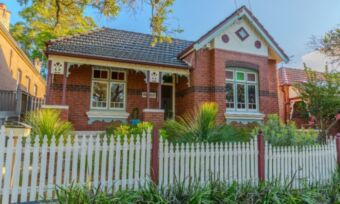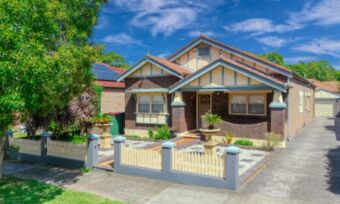How to sell your own home in Australia
Selling your own home offers the potential to save, but before waving away real estate agents to sell your home yourself, it pays to research carefully.

Selling your own home offers the potential to save, but before waving away real estate agents to sell your home yourself, it pays to research carefully.
Key points:
- It is possible to sell a home in Australia without using a real estate agent, often called selling privately.
- You could save paying a commission to a real estate agent, but you will need a lawyer or conveyancer to look at the contract.
- There could still be a range of likely costs associated with marketing, staging and selling your home.
There are a number of ways to sell a home in Australia. You might opt to sell by treaty or tender, or take your property to auction, both of which would involve engaging the services of a real estate agent. You could also opt to sell your house yourself, but if you want to explore this option, it’s important to know what you’re in for to avoid any surprises, and ideally to engage the services of a legal professional.
Can you sell your home yourself in Australia?
It’s definitely possible to sell your home yourself in Australia and avoid going through a real estate agent, however, if you choose to sell privately, it is important to be very cautious. The Queensland Government advises that if you choose to go down this route, then you should always engage a solicitor to check the contract of sale for the home.
How much can I save by selling my own home?
Agents’ selling commission is not something that’s regulated in Australia. How much you pay depends on the commission model the agent uses, their commission rate – and in most cases, the sale price achieved for your home as commission is usually charged as a percentage of the sale value. According to OpenAgent, sales commission paid to selling agents ranges from about 1.0% to 3.6% of a property’s sale price – hypothetically, if you were to sell a home for $800,000, you might expect the commission to be between $8,000 and $28,800.
Depending on the agent’s sales package, you could also be expected to pay for the marketing of your home. These costs can include brochures, social media posts, signage, professional photography, real estate portal listings and newspaper and magazine advertisements. Sellers are normally able to pick and choose the marketing costs they are prepared to pay for, but depending on the level of marketing you and your agent opt for, you may find that packages including signboards, brochures, professional real estate photography, print or online ads or other such marketing tools could cost several thousand dollars.
How easy is it to sell your own home?
The complexity of selling your own home may come down to how competently and thoroughly you can complete the associated tasks. If you can set the right price, make sure all the administrative tasks are correctly taken care of, and view your home through an objective lens to recognise where a clean-up or even home styling may be needed, you could potentially save thousands of dollars in agent’s commission.
That said, the overwhelming majority of homes are sold through a real estate agent. Comparison site Whichrealestateagent.com.au estimates that real estate agents generally handle 90% to 95% of all residential property sales in Australia. This is because agents have the know-how to sell homes and negotiate prices, and can guide sellers through the unfamiliar process of selling a house, which is the kind of assistance that would not be available to you if selling your home yourself.
What do real estate agents do in Australia?
A real estate agent is the gatekeeper between potential buyers and the seller (vendor), which means that the seller does not have to deal directly with buyers. They help people rent our or sell their property, which could include:
- providing market research to the vendor, such as a report detailing what their property might be worth based on sales of similar properties in the area (called a comparative market analysis, or CMA). This is typically a free service, and you do not usually need to have signed an agreement with an agent for this information to be provided.
- marketing the property, such as arranging for advertising, signage, social media posts, listing on real estate websites, etc
- hosting ‘open homes’ or inspections on behalf of the vendor
- negotiating with potential buyers
- supplying the contract and recording conditions on it
- auctioning the property, or hiring an auctioneer
- handling some of the settlement activities, such as taking and holding the deposit, giving the keys to the buyer.
Real estate agents need a licence to operate in Australia and registration typically involves completing relevant training and a period of work experience. The agent is obligated to work for the vendor and represent their best interests, according to the Australian Competition and Consumer Commission (ACCC). While commission and fee structures are not regulated in Australia, they are typically negotiable.
If you do decide to engage an agent, the ACCC recommends getting opinions about the value of your property from different agents, and requesting a written schedule of potential fees, before signing any agreements.
That said, if you have the time and you’re confident of your negotiating skills, you may decide to consider selling your home privately.
How to sell your own home without an agent
There are a few different approaches you could take when selling your own home without an agent, which include doing all of the selling, negotiating and marketing yourself, or engaging the services of a DIY support service. A potential catch of going it alone is that some popular online selling sites such as realestate.com.au require advertisers to hold a registered real estate licence.
Of course, there’s a lot more to selling a home than marketing your property. When you sell your own home, you will be doing all the work an agent is paid to do – everything from researching the market to set an appropriate price for your place, handling buyer enquiries and conducting inspections and price negotiations. You will also be expected to obtain and manage a deposit and handle settlement if you find a buyer.
This can involve plenty of responsibility on your behalf, and it’s worth a closer look at three key aspects of selling your own home without an agent:
Managing the legal side of your home sale
When you sell your own home, you won’t have the benefit of a real estate agent’s expertise to guide you around administrative aspects of the sale. In NSW for instance, a property cannot be advertised for sale unless a contract of sale is already drawn up. You may also be required to provide additional paperwork depending on your state or territory. In Victoria, sellers must give buyers a ‘Section 32 (or Vendor’s) Statement’ that contains information about the property’s title as well as a declaration about whether the home is located in a bushfire-prone area.
The Queensland Government notes that, when drafting a contract of sale for a home, but one of the most important factors to be aware of is the cooling off period, or the period in which time the buyer can change their mind. The rules around cooling off periods vary around the country, so if you are thinking of selling a home privately, it’s very important that you discuss this with a legal professional to find out how and where it should be included in the contract.
This highlights the value of teaming with an experienced conveyancer or solicitor who can guide you on the paperwork and other formalities that are part of the home selling process.
Setting a price for your home
Determining a realistic asking price for your home is a critical step. Ask too little and you could end up short-changing yourself, possibly by tens of thousands of dollars. Set the sales price too high, and you could deter buyers from viewing your home. Establishing a realistic price can involve looking at your home objectively – and that’s not always easy. Research by the Commonwealth Bank found that as many as one in two home owners are likely to overvalue their property. To set a suitable price you could engage a property valuer to provide a professional valuation, or be prepared to do plenty of research on what similar properties are selling for in your area.
Do you have the time to sell your own home?
You also need to consider how much time you can devote to selling your home and negotiating with buyers.
Ideally, you need to be able to respond promptly to buyer enquiries and show interested parties through your home – potentially during business hours and/or on weekends. It can be a good idea to consider whether your job (and lifestyle) offers the flexibility to drop everything and take calls or meet with buyers at short notice particularly during workdays. If that’s not the case, you may need to set clear inspection/contact times, something that may not suit every potential buyer.
How much does it cost to sell your own home?
The cost of selling your home privately varies depending on how you decide to do it. For example, if you decide to use free marketing methods – such as word-of-mouth, unpaid social media posts or making a homemade sign – it could cost you next to nothing. However, generally speaking, it’s easier to sell a property when more people are aware of it. This could mean spending money on paid advertising or other marketing methods.
A number of services are available to help homeowners market their property, without the help of a real estate agent. Here is a guide of what you can be asked to pay through various services:
- Forsalebyowner.com.au – offers packages priced from $699 to $799 with varying inclusions such as signage, professional photography and listings on online property sites
- Agentinabox.com.au has packages priced from $595 to $1,995
- Noagentproperty.com.au has packages priced from $848 to $2,398
- Sellmypropertynow.com.au lets you list your property on various online selling sites for $448
The different price points make it important to compare services, and read the fine print so you know what is (and isn’t) included with each package.
Cover image source: Prostock-photo/Shutterstock.com
This article was reviewed by our Editor-in-Chief Nina Rinella before it was updated, as part of our fact-checking process.

Alasdair Duncan is Canstar's Deputy Finance Editor, specialising in home loans, property and lifestyle topics. He has written more than 500 articles for Canstar and his work is widely referenced by other publishers and media outlets, including Yahoo Finance, The New Daily, The Motley Fool and Sky News. He has featured as a guest author for property website homely.com.au.
In his more than 15 years working in the media, Alasdair has written for a broad range of publications. Before joining Canstar, he was a News Editor at Pedestrian.TV, part of Australia’s leading youth media group. His work has also appeared on ABC News, Junkee, Rolling Stone, Kotaku, the Sydney Star Observer and The Brag. He has a Bachelor of Laws (Honours) and a Bachelor of Arts with a major in Journalism from the University of Queensland.
When he is not writing about finance for Canstar, Alasdair can probably be found at the beach with his two dogs or listening to podcasts about pop music. You can follow Alasdair on LinkedIn.
The comparison rate for all home loans and loans secured against real property are based on secured credit of $150,000 and a term of 25 years.
^WARNING: This comparison rate is true only for the examples given and may not include all fees and charges. Different terms, fees or other loan amounts might result in a different comparison rate.
 Owner occupied
Owner occupied
 20% min deposit
20% min deposit
 Redraw facility
Redraw facility
Try our Home Loans comparison tool to instantly compare Canstar expert rated options.





